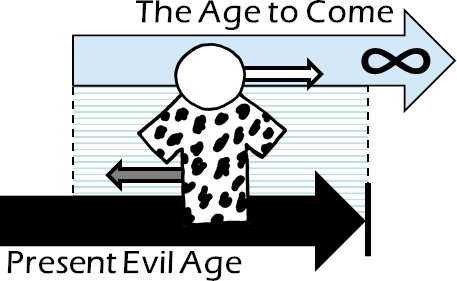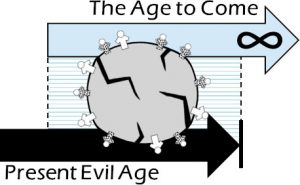My previous post discussed the fact that Christians must battle against sin until Jesus returns. Only then will our bodies be raised to resurrection life in which we no longer experience ‘fleshly’ desires that lure us into sin. In God’s kingdom we will still be human and we will still have desires. In fact we will be more human than we have ever been! The difference is that we will no longer be mastered by bodily desires; they won’t lead us to sin.

In the meantime Christians live in-between worlds. Our old nature pulls us toward sin and death. However, the resurrection of Jesus has already begun its work in his people. Jesus’ Holy Spirit is presently renewing our hearts and minds by his word so that we will be eager to obey him (Titus 2:11-14). I argued that this is the framework within which the experience of sin narrated in Romans 7 should be understood. Until Jesus returns we should expect to experience triumph over sin and genuine change, but also a persistent failure to obey God as we know we should. Our hearts and minds will seek to please God, but our flesh will pull in the opposite direction.
This leads to the big aspect of Romans 7 that I avoided. On several occasions, after explaining my view on this passage I have been asked the question:
What about the law? How does the law of Moses fit into all this?

It’s a good question. Romans 6:14-8:7 refers to the law more than 30 times and yet I completely ignored it. My reasons were mainly to do with simplicity and clarity. You can’t cover everything at once! The details I highlighted in Romans 6-8 are sufficient to show that the man described in Romans 7 is a normal Christian battling the flesh by the Spirit. Also, the place of the law in the Christian life is a very complicated and much debated topic in its own right. Trying to deal with two challenging topics at the same time seemed a bad idea.
That said, I can’t responsibly ignore the place of the law in Romans 7. So, let’s get into it!
The Law Written on Hearts and Minds
Throughout the Old Testament, God’s people proved unable to obey God in any lasting way. They didn’t just sin but repeatedly fell into outright rebellion and lawlessness. Mercifully, God promised a time when his law would no longer merely be external legislation that his people lived under.
“This is the covenant I will make with the people of Israel after that time,” declares the LORD. “I will put my law in their minds and write it on their hearts. I will be their God, and they will be my people.”
Jeremiah 31:33

This experience of the law being written on ‘minds’ and ‘hearts’ is exactly what we find expressed in Romans 7. The Holy Spirit creates a people who are eager to obey God’s commands. Only believers with the Spirit can say, with David, “O how I love your law!” (Psalm 119:97), or with Paul “in my inner being I delight in God’s law” (Romans 7:22). Only those with the Spirit “hunger and thirst for righteousness” in the way that Jesus described (Matthew 5:6).
In short, our relationship to God’s law changes dramatically when we are converted. The non-Christian lives according to the flesh. For them the law is an unwelcome external authority that highlights how sinful they are. It pushes against their own inward desires from outside as an unwelcome intruder to their lives. Christians, on the other hand, have the law written on their hearts. For them them God’s law becomes an object of delight and humble devotion. We no longer live by the external law but by the Spirit who writes the law on our hearts so that we will seek God and his ways (Romans 7:6). This is how the gospel of salvation by faith alone does not ‘nullify the law’ but rather ‘upholds the law’ (Romans 3:31). Faith leads to the law being written on our hearts.
Under Law or Under Grace?
This different experience of the law is based on a fundamental shift in existence that occurs at conversion. Romans 5-8 describes two humanities that coexist in this present age. On the one hand there are those ‘in Adam’ who live the life of the flesh, and whose end will be the just condemnation that the law demands. On the other hand, there are those who are united to Christ and who share in Jesus’ relationship to the law.

And Jesus’ relationship to the law is a wonderful thing to share in! Laws only apply to people who live under their rule. Once you die you are freed from the legal demands of your previous life (Romans 7:1-4). In the case of Jesus, he died to the old order (the present evil age) and was raised into the life of the Spirit (the age to come). The power of death will never again have any bearing upon him. He is dead to them. Or better, they are dead to him (Romans 6:9-10). Christians are united to Jesus in his death and resurrection and therefore share the same relationship to the old order that Jesus has (Romans 6:4-5, 11). We live under grace, not law (Romans 6:14-15).

Living under the Grace doesn’t mean that we ignore the law. What it means is that we don’t observe the law as law anymore. Think about it: laws provide the basis for punishing wrongdoing. To be under a system of law is to be under its authority to punish you when you transgress its demands. Christians don’t have this relationship to God’s law anymore. In Christ we have died to the old order and have been raised with Christ into the new creation. For Christians the law can’t threaten punishment. Instead it teaches us what it means to love God and neighbor (Matthew 22:36-40). Christians can now approach the law with joy and enthusiasm. It promises to instruct us in how to please God without any threat of condemnation (Romans 8:33-34).
Yet it isn’t quite as simple as that. In Romans 7 Paul sounds like he is condemned by the law:
‘I found that the very commandment that was intended to bring life actually brought death. For sin, seizing the opportunity afforded by the commandment, deceived me, and through the commandment put me to death.’
Romans 7:11-12
Romans 7 is complicated because it describes two sides of Christian experience simultaneously. On the one hand a Christian’s renewed heart and mind see sin for what it is and seek to obey God. They delight in the law (Romans 7:22). But on the other hand the law highlights our ongoing failings, caused by our ‘flesh’, contrary to our renewed desires (Romans 7:19-20). The law shows that we are not yet perfect and will not be until the day of our resurrection.
Being a Christian doesn’t make you blind to your sinfulness. On the contrary, it should make you more sensitive to it! That will lead us continually back to our savior for renewal in his grace. This two-sided experience of the law is why Paul can both call himself a ‘wretched man’ and look forward to the day when Jesus will ‘rescue us from this body of death’ when he returns and resurrects us (Romans 7:24-25). Only Christians can delight in a law that promises death to the disobedient. For us it directs us to our savior anew, and teaches us his ways.
I’m sure that this post raises many questions. You might ask: “don’t some bits of the law only apply to national Israel, or to sacrifices, or to food laws?” The law is a big topic. God-willing, we shall return to it again.
